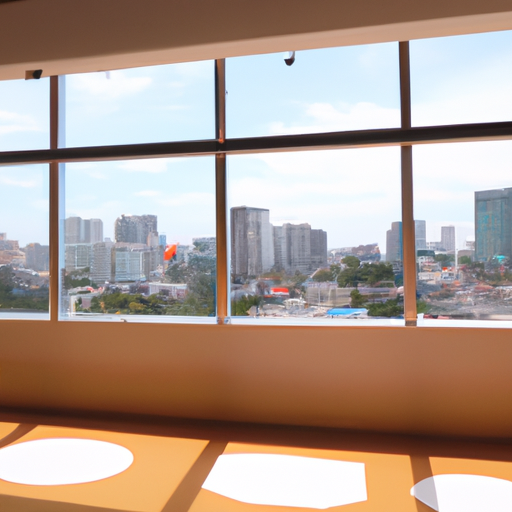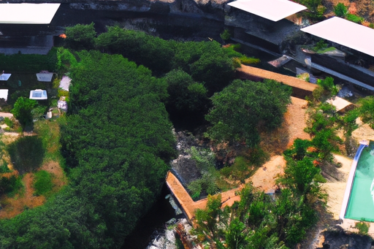
Innovative Design Solutions for Sustainable Hospitality: Exploring the Finalists of the 2023 Sustainable Hospitality Challenge
The Sustainable Hospitality Challenge is an annual competition that aims to recognize and promote innovative design solutions for sustainable hospitality. In 2023, the finalists of this prestigious challenge are all from design and tech universities, showcasing their cutting-edge ideas and technologies.
One of the finalists is a team from a renowned design university. Their project focuses on creating sustainable and eco-friendly hotel rooms. They have incorporated various elements such as energy-efficient lighting, water-saving fixtures, and recycled materials in their design. The team has also integrated smart technology to monitor and control energy consumption, ensuring that the hotel rooms are as sustainable as possible.
Another finalist is a team from a leading tech university. Their project revolves around using artificial intelligence (AI) to optimize hotel operations and reduce waste. They have developed a smart system that analyzes data from various sources, including guest preferences, occupancy rates, and energy usage. This AI-powered system then suggests personalized recommendations to hotel staff, enabling them to make informed decisions that minimize waste and maximize efficiency.
The third finalist is a collaboration between a design and tech university. Their project focuses on sustainable food and beverage practices in the hospitality industry. They have developed a mobile app that connects hotels with local farmers and suppliers, promoting the use of locally sourced and seasonal ingredients. This not only reduces the carbon footprint associated with transportation but also supports local communities and economies. Additionally, the team has designed a waste management system that efficiently separates and recycles food waste, further reducing environmental impact.
All three finalists have demonstrated a deep understanding of the challenges faced by the hospitality industry in terms of sustainability. They have come up with innovative solutions that not only address these challenges but also enhance the overall guest experience.
The design university team’s eco-friendly hotel rooms not only contribute to a greener environment but also provide a unique and memorable stay for guests. The use of recycled materials adds a touch of creativity and sustainability to the design, while the smart technology ensures that guests can easily control and monitor their energy consumption.
The tech university team’s AI-powered system revolutionizes hotel operations by providing real-time data and personalized recommendations. This not only improves efficiency but also enhances the guest experience by tailoring services to individual preferences. The reduction in waste and energy consumption also aligns with the growing demand for sustainable practices in the hospitality industry.
The collaboration between the design and tech universities brings together the best of both worlds. The mobile app connects hotels with local farmers and suppliers, promoting sustainable and ethical sourcing practices. This not only benefits the environment but also supports local communities. The waste management system ensures that food waste is efficiently recycled, minimizing the environmental impact and contributing to a circular economy.
In conclusion, the finalists of the 2023 Sustainable Hospitality Challenge from design and tech universities have showcased their innovative design solutions for sustainable hospitality. Their projects not only address the challenges faced by the industry but also enhance the overall guest experience. From eco-friendly hotel rooms to AI-powered systems and sustainable food and beverage practices, these finalists are leading the way towards a more sustainable future for the hospitality industry.
Technological Advancements in the Hospitality Industry: A Closer Look at the Finalists of the 2023 Sustainable Hospitality Challenge

The hospitality industry has always been at the forefront of innovation, constantly seeking ways to improve the guest experience while also reducing its environmental impact. In recent years, there has been a surge in technological advancements that have revolutionized the way hotels and resorts operate. From smart room controls to energy-efficient systems, these innovations have not only enhanced the guest experience but also made the industry more sustainable.
One platform that has been instrumental in driving these advancements is the Sustainable Hospitality Challenge. This annual competition brings together design and tech universities from around the world to showcase their innovative solutions for a more sustainable hospitality industry. The 2023 finalists of the challenge have recently been announced, and they are truly pushing the boundaries of what is possible.
One of the finalists is a team from a renowned design university in Europe. Their project focuses on creating a sustainable hotel room that incorporates biophilic design principles. Biophilic design is a concept that seeks to connect people with nature by incorporating natural elements into the built environment. The team has developed a room that features living walls, natural lighting, and sustainable materials. Not only does this design create a calming and rejuvenating space for guests, but it also reduces the hotel’s energy consumption and carbon footprint.
Another finalist comes from a tech university in Asia. Their project centers around the use of artificial intelligence (AI) to optimize hotel operations. By analyzing data from various sources, such as occupancy rates, weather forecasts, and guest preferences, the AI system can make real-time adjustments to energy usage, staffing levels, and other operational aspects. This not only improves efficiency but also reduces waste and costs. The team has already conducted successful pilot tests in several hotels, and the results have been promising.
A team from a leading design university in North America has also made it to the finals. Their project focuses on waste management in hotels. They have developed a comprehensive system that tracks and analyzes waste generation, identifies areas of improvement, and implements strategies to reduce waste. This includes implementing recycling programs, composting organic waste, and working with suppliers to reduce packaging waste. The team’s innovative approach has already been implemented in several hotels, resulting in significant reductions in waste and cost savings.
These are just a few examples of the incredible projects that have made it to the finals of the 2023 Sustainable Hospitality Challenge. Each team brings a unique perspective and innovative solution to the table, showcasing the power of design and technology in creating a more sustainable hospitality industry.
The competition not only provides a platform for these universities to showcase their work but also fosters collaboration and knowledge sharing among industry professionals. It serves as a catalyst for change, inspiring hotels and resorts around the world to adopt these innovative solutions and make sustainability a priority.
As we look to the future of the hospitality industry, it is clear that technological advancements will continue to play a crucial role in driving sustainability. The finalists of the 2023 Sustainable Hospitality Challenge are leading the way, showing us what is possible when design and tech universities come together to create a more sustainable future. With their innovative solutions, they are setting a new standard for the industry and inspiring others to follow suit.
Leading Design and Tech Universities Making Waves in the Sustainable Hospitality Challenge 2023: An Overview of the Finalists
The Sustainable Hospitality Challenge is an annual competition that aims to recognize and promote innovative solutions in the hospitality industry. In 2023, the challenge has attracted a diverse range of participants, including leading design and tech universities from around the world. These universities have made significant strides in developing sustainable practices and technologies that can revolutionize the way the hospitality industry operates.
One of the finalists in the challenge is the Massachusetts Institute of Technology (MIT). Known for its cutting-edge research and technological advancements, MIT has developed a range of sustainable solutions for the hospitality industry. Their entry focuses on the use of artificial intelligence (AI) and machine learning to optimize energy consumption in hotels. By analyzing data on guest behavior and occupancy rates, MIT’s system can automatically adjust lighting, heating, and cooling to minimize energy waste. This not only reduces the carbon footprint of hotels but also helps them save on energy costs.
Another finalist is the Royal College of Art in London. This prestigious institution has a strong focus on design and innovation, and their entry in the challenge reflects this. The Royal College of Art has developed a concept for a sustainable hotel that incorporates biophilic design principles. Biophilic design aims to connect people with nature by incorporating natural elements into the built environment. The hotel features living walls, rooftop gardens, and large windows that provide ample natural light. This not only creates a pleasant and calming atmosphere for guests but also reduces the need for artificial lighting and improves air quality.
The University of California, Berkeley is also among the finalists. This renowned institution has a long history of environmental activism and sustainability initiatives. Their entry in the challenge focuses on waste management in hotels. The University of California, Berkeley has developed a system that uses advanced sensors and AI to track and optimize waste disposal processes. By monitoring waste generation, sorting, and recycling, hotels can significantly reduce their environmental impact. This not only benefits the planet but also improves the efficiency and cost-effectiveness of waste management operations.
The final finalist in the challenge is the Delft University of Technology in the Netherlands. This university is known for its expertise in sustainable architecture and urban planning. Their entry in the challenge revolves around the concept of circular economy in the hospitality industry. The Delft University of Technology has developed a blueprint for a hotel that incorporates recycled and upcycled materials. The hotel is designed to be modular, allowing for easy disassembly and reconfiguration. This not only reduces construction waste but also enables the hotel to adapt to changing needs and trends in the industry.
These leading design and tech universities have demonstrated their commitment to sustainability and innovation through their entries in the Sustainable Hospitality Challenge. Their solutions have the potential to transform the hospitality industry and pave the way for a more sustainable future. By harnessing the power of technology and design, these universities are showing that sustainable practices can go hand in hand with exceptional guest experiences. As the finalists in the challenge, they are leading the way in shaping the future of sustainable hospitality.


